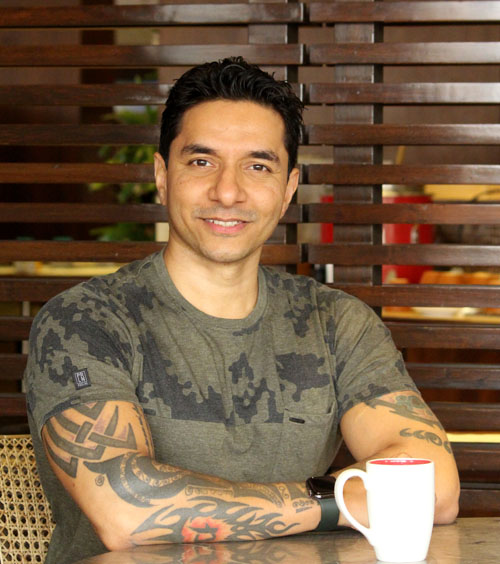
Neha Prasada interviews Holistic Health coach Luke Coutinho. He emerges as a voice of reason while we are drowning in a blitzkrieg of information with the internet teeming with websites and social media accounts that promise attractive and quick-fix solutions to getting our minds and bodies on track.
While social media and the internet are good sources of information and awareness, people also tend to start following diet trends and detox programmes blindly. Is this causing more harm than helping people?
We cannot blame social media for people blindly following others diet plans and trends. This is simply one person copy-pasting what worked for someone else and expecting it to work for them, not understanding that a cookie-cutter approach towards diet plans and detox never works.
In a bid to lose weight, people try to adopt a crash or fad diet, and while they may lose oodles of weight, they usually come to us with bigger problems like compromised immunity along with low energy levels, dull skin and hair and severe vitamin deficiencies.
How does someone interested in paying attention to their health and fitness make a start?
The first step is to identify a clear goal. If your goal is constantly changing – because you do not know what you truly want or are simply following what others around you are doing – your process and results will constantly change too. So, have a crystal-clear goal that is driven from within, and not by what others are doing.
Once your goal has been set, plan the path or process to get there by identifying what you really need to work on. To simplify this, we encourage people to divide their lifestyle and health into four pillars – nutrition, exercise or physical activity, sleep and emotional wellness. Assess each of these pillars and select the one that needs the most attention. Once you have identified that pillar, break it down further and think of the top three steps you can take to improve it. You do not have to strive to accomplish all three. Start with one step.
For example, if your goal is to lose weight and the pillar you need to work on is sleep, then your smallest action step can be to switch off your gadgets and artificial lights a minimum of one hour before bedtime. And this is actually where most people fail. They aren’t committed to the process. The process and actions have to be aligned to the goal.
Does one size fit all in terms of a health and fitness programme or guide?
Absolutely not. Each of us is as unique as our fingerprints. Not a single person on this planet, not even identical twins, are the same. Sugar, carbs, vegetables, meat, and fish suit and work for some but can become the biggest enemies of others. Some bodies thrive on carbs, while some don’t. Some are fat and protein-efficient, and some aren’t. Coffee and tea may be good for many, but harmful to others. Some people can have a peg or two every day well into their 90s and are happy and healthy, while some people start having issues with the liver or addiction problems with alcohol in their 20s. Some people like breakfast, others don’t. Some like being vegan, and some don’t. Some manage well with fasting, and some don’t. So, a cookie cutter approach can be a massive failure because you are a unique bio-individual with unique needs.
I believe that the reason our health, relationships, and personal growth are at their worst at this point is because society, media, social media, communities, medicine, fitness, and spirituality are all trying to put people, which is YOU, in a box.
One of the most popular diet trends is intermittent fasting, and this is something you believe in and talk about yourself. Is it safe for people to start doing it without professional guidance?
Intermittent fasting has been made into a diet or a trend, but it isn’t. It becomes a fad when it is blindly copied without knowing what works for you, or when you are trying to treat it as a competition and extend your fasting hours beyond what is comfortable for you or simply making mistakes like breaking your fast with coffee or trying to diet during the building phase.
Intermittent fasting is how human beings have been designed to live and eat. It might have the moniker of fasting, but it is actually a way of living. Our bodies aren’t capable of digesting meals late at night. We still go ahead and do it, but it always comes with a cost. Intermittent fasting is simply a way of disciplining our meal timings and something like circadian rhythm fasting aligns it with the circadian rhythm, which is the sunset to sunrise pattern.
For a normal healthy individual with no underlying health conditions, the safest and most natural way to fast is the circadian rhythm fasting or the sunset to sunrise fast. It is what all of us should be following anyway. However, if you have a medical condition, undergoing a medical treatment or are on medications, it is recommended that you undertake fasting only under professional guidance.
What do you think of “healthy juices” like, for instance, the seemingly harmless lauki or bottle gourd juice which has proved to be harmful for some people? Taking wheatgrass shots, aloe vera juice and celery juice are also very common trends. How do you pick and choose the right juices for the system?
Downing wheatgrass, celery, aloe vera or lauki shots one after another is nothing but a fad. Just because it sounds fancy, it doesn’t mean these shots are going to bring about a miraculous change in your health. If they did, disease statistics wouldn’t be as bad as they are right now. Yes, there are specific cases where we use wheatgrass juice or aloe vera juice (like in the case of acidosis) as a medicine, but most people don’t need to rely on these beverages to stay healthy. You can have the simplest diet and be in the best of shape, immunity and health.
Also, the whole fad of juicing now is resulting in excess consumption of fibre, which can do more harm than good. consuming more than the recommended amount of fibre can cause bloating or irritate the gut linings and cause inflammation. So, in this case, less is more, I’d say.
What is your advice to someone who wants to start on a wellness journey but does not have access and the means to an expensive fitness coach or teacher?
The first thing to remember when you embark on a wellness journey is that you do not have to hire a fitness coach or teacher. Start from where you are. There are several safe and inexpensive ways to get started. If you’re looking for ways to increase your activity levels, you can start off with a walk, simple yoga asanas, doing a stair workout, or body-weight exercises. There are also several free videos and exercise programs that you can watch on the internet. Of course, if you have a physical condition, or some kind of limitation like a backache, you might need professional guidance, but for everyone else, starting a wellness journey does not have to be an expensive affair.
According to you, what is “too much” for someone who is trying to do everything right and include all the advice and health information out there?
I always encourage lifestyle changes that are easy, realistic and sustainable. For example, if you want to lose weight and are thinking of joining the gym, ask yourself if you are really a gym person? Do you think working out in the gym is sustainable for you? Or would walking and talking while on calls and choosing a flight of stairs instead of the elevator work better for you?
Focus on the small wins. People wonder what real difference can chewing one meal make. But never forget the power of compounding. The sum of small wins makes a big win. So, it’s okay if you choose small.
Is it okay to switch from following one diet to another, something health shoppers seem to indulge in very frequently?
Jumping from one diet to another is not just frustrating and demotivating but will also never get the results you wish to see. There are so many clients who come to us after trying every single diet under the sun, but in vain. When they finally discover the lifestyle that works for them, they are so happy and satisfied because they are also getting results.
Sometimes you notice that people who follow very strict disciplines, those who don’t smoke or drink, end up with serious health complications and many others who do not follow any diet plans etc, lead long, healthy lives. How does that work?
When we look at our data and the kind of cases that come to us, we have hardcore vegetarians who are sick as well as hardcore non-vegetarians who are perfectly healthy, and also enjoy a drink or two every day. So, there is no data to prove that one kind of people, those who don’t drink or only eat vegetarian meals, are healthy. And while I am not advocating smoking at all, there are individuals who occasionally smoke but have cleaner blood reports than someone who doesn’t. This goes to say that health is so much beyond not smoking, drinking and living to a strict regime. It all comes down to your overall lifestyle and not just diet. It is about the kind of emotions you deal with on a daily basis, your activity levels, sleep quality, vitamin levels, quality of your relationships and your overall happiness quotient.

Luke Coutinho is a widely followed holistic Lifestyle Coach, Integrative and Lifestyle medicine practitioner, and founder of You Care.






Leave a Reply